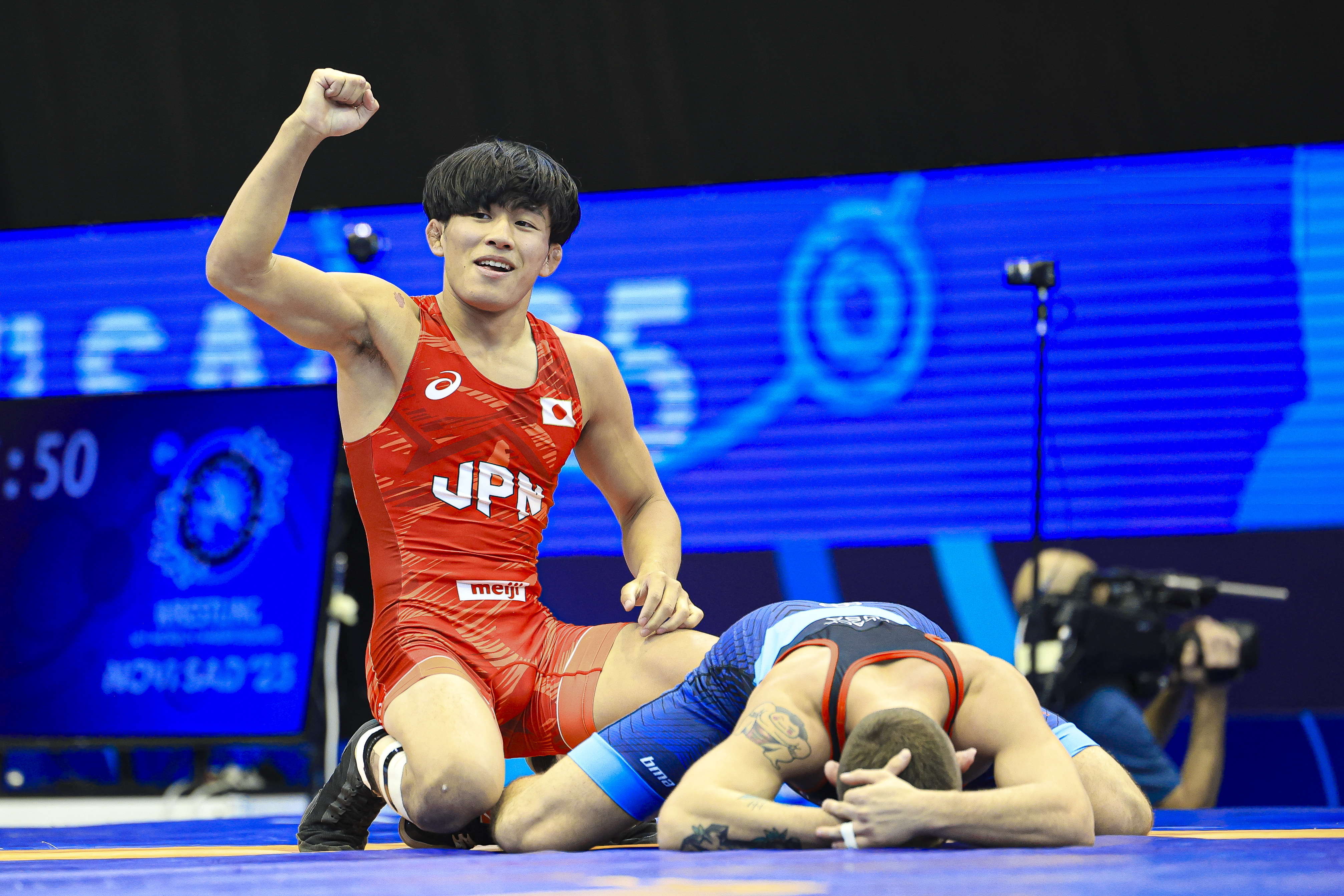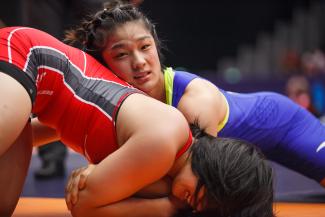NOVI SAD, Serbia (October 22) -- Yehor YAKUSHENKO (UKR) has lost only one bout in 2025 but that one loss remains tied to him when he steps on the mat.
At the U20 European Championships final, Yakushenko lost to Darius KIEFER (GER), 5-3, losing his gold medal to the German wrestler. But using that loss as a lesson and motivation, Yakushenko has now won two world titles in the space of two months.
The 19-year-old won gold at the U20 World Championships in August and on Wednesday at the U23 World Championships in Novi Sad, Yakushenko won his first U23 world title.
"If I hadn’t lost at the Europeans, I wouldn’t have won at Worlds," Yakushenko said. "Sometimes a loss can be for the better. It motivated me and helped me mentally."
Yakushenko, who avenged that loss to Kiefer at U20 Worlds, wrestled with great temperament at the U23 Worlds despite carrying an injury after his first bout. In four matches, he began with a win over Luka GABISONIA (GEO), held off Abubakar KHASLAKHANU (UWW) and defeated Richard KARELSON (EST) in the semifinals.
Facing senior Asia silver medalist Iussuf MATSIYEV (KAZ) in the final, Yakushenko used a stepout and turn from par terre to lead 4-0. Matsiyev was docked two points for a defensive foul as Yakushenko extended his lead to 6-0.
When Matsiyev got the par terre position in the second period, Yakushenko easily defended it and managed to win the final 6-1, thus claiming gold.
"I’m euphoric right now," he said. "I feel that it really wasn’t that easy. I guess I just worked hard and prepared well, went through good training. My shoulder hurts a little. But I think it’s actually from the rib."
Yakushenko was in Porec, Croatia at the preparatory camp for senior World Championships. Though he did not participate in the tournament, Yakushenko was part of the Ukraine team and watched the matches in Zagreb.
"We had a camp in Croatia, where many countries were present," he said. "I watched, got motivated, I was overwhelmed with emotions. My weight category is very strong, but I think everything is within my reach."
The two-time U20 world champion believes that needs to build more strength to be ready for the senior level but will not shy from a chance to earn his spot on the senior Ukrainian team next year.
"I still need to build more physical strength," he said. "But technically, I don’t think I have problems, and my endurance is good too.
"There should be the Ukrainian Cup in November, I’m not sure yet. It’s the qualification event for the European Championships. Maybe I’ll compete there, give our senior team a bit of a shake-up. I don’t know yet, I’ll depend on what my coach says. Whatever he decides, I’ll do."
Iran closer to cleansweep
Iran won its third gold medal in Greco at the U23 World Championships and has now all-but-confirmed the team trophy. With the team title in Novi Sad, Iran will assert its domination in Greco as it won team titles in all World Championships -- U17 in Athens, U20 in Samokov and senior in Zagreb -- to go with the one in Novi Sad, Serbia.
It consolidated its position on the top when former U23 world champion at 63kg, Iman MOHAMMADI (IRI) won gold at 72kg on Wednesday. Mohammadi defeated Abror ATABAEV (UZB), 5-1, in the final.
Mohammadi was awarded the par terre in he first period and he hit a front headlock which was scored two and one more point was awarded for a stepout. But Iran challenged, claiming four points on the throw, which was confirmed on review but the stepout point was removed as it was a push.
After the challenge, Mohammadi led 5-0 and when Atabaev was given par terre in the second period, Mohammadi defended that position with ease and went on to win the gold medal.
Azerbaijan won its second gold medal in Greco-Roman after Elmir ALIYEV (AZE) held off Alibek AMIROV (UWW), 3-2, in the 55kg final. With the win, he also avenged his U23 European Championships semifinals loss to Amirov.
Egypt got its first world title at any level since 2023 and first at U23 in six years after Hassan ABDELREHIM (EGY) blanked Anri KHOZREVANIDZE (GEO), 3-0, in the 67kg. Incidentally, Egypt's other two U23 world titles, both won by Mohamed EL SAYED (EGY) in 2018 and 2019, have come at 67kg.
 Alexandrin GUTU (MDA) completes a five-pointer. (Photo: United World Wrestling / Amirreza Aliasgari)
Alexandrin GUTU (MDA) completes a five-pointer. (Photo: United World Wrestling / Amirreza Aliasgari)
Gutu in third straight final
Alexandrin GUTU (MDA) is a win away from becoming the first three-time U23 world champion after he reached the 82kg final in Novi Sad.
Gutu, wrestling at the U23 Worlds for the fifth time, reached the his fourth straight final after beating Ibrahim TABAEV (BEL) in the semifinals. Gutu won gold medals in 2023 and 2024 and has a silver medal from 2022.
He began with a takedown before adding a stepout for a 3-0 lead. The par terre gave him one more point and he threw Tabaev out-of-bounds for one more point and lead 5-0. The second period saw him add one stepout as he won the semifinal 6-0.
For his third straight gold medal, Gutu will face Ruslan ABDIIEV (UKR) who defeated Data CHKHAIDZE (GEO), 1-1, in the other semifinal, thanks to the first-point criteria in a 1-1 finish.
 Koto GOMI (JPN) celebrates after winning the 60kg semifinal against Maxwell BLACK (USA). (Photo: United World Wrestling / Amirreza Aliasgari)
Koto GOMI (JPN) celebrates after winning the 60kg semifinal against Maxwell BLACK (USA). (Photo: United World Wrestling / Amirreza Aliasgari)
At 60kg, Koto GOMI (JPN) will try to the six-year gold medal drought for Japan after he reached the 60kg final on Wednesday after a dominant performance. He faced Maxwell BLACK (USA) in the semifinals and like his previous bouts, he began by scoring as soon as the match began.
An arm-drag to takedown gave him a 2-0 lead before he got the par terre position and scored three rolls using high gut-wrench and win 9-0.
He will face Sajjad ABBASPOUR (IRI) for gold after he made a remarkable comeback in the final 20 seconds. Down 3-1 against Mehroj BAKHRAMOV (UZB), Abbaspour scored a stepout which was also called fleeing with 13 seconds left. However, Bakhramov still held the criteria at 3-3 as he had a two-point move.
But Abbaspour did not give up and scored another stepout with five seconds left, giving him a match-winning 4-3 lead. Uzbekistan challenged it but only to lose it and add one more point to Abbaspour's score.
The 5-3 defeat left the teenager Bakhramov in tears while the Iran corner celebrated the unexpected win in the semifinals.
U.S. perfect
Audrey JIMINEZ (USA) will get another chance of winning her first-ever world title after she reached the 50kg finals after posting a controlled 5-2 win against Aida KERYMOVA (UKR) in the semifinals. Jiminez, who had four age-group world silver medals, scored a takedown and one turn in the second period to overcome a 2-1 deficit and post the win.
She will face Jinyue LIANG (CHN) for that much-awaited gold after Liang saw off Natalia PUDOVA (UWW) in the other semifinal. Liang scored a takedown in the second period to lead 2-1 and then got in scramble which that scored two points each. She then hit a headlock for four to make the score 8-3, her winning score in the final.
Former U20 world champion Jasmine ROBINSON (USA) reached the final at 72kg with her third technical superiority win in three bouts. She defeated former U17 world champion Veronika VILK (CRO), 10-0, in the semifinals using her trademark double blasts.
Nurzat NURTAEVA (KGZ) will look to stop Robinson from winning her first U23 world title after she reached the final at 72kg after beating Mahiro YOSHITAKE (JPN), 6-3.
Returning champion at 72kg, Kylie WELKER (USA), who moved up to 76kg, reached the final after a 16-6 technical superiority win over Edna JIMENEZ VILLALBA (MEX).
Welker began with a four-pointer before two turns made it 8-0. But Villalba also hit a four-pointer to cut the lead to 8-4. She then had Welker in danger to make it 8-6 bit a reversal and three lace turns tilted the semifinal 15-6 in favor to Welker, who scored a stepout in the second period for the win.
She will take on returning bronze medalist Valeriia TRIFONOVA (UWW) who posted a 4-1 win over Elmira YASIN (TUR) in the other semifinal.
RESULTS
55kg
GOLD: Elmir ALIYEV (AZE) df. Alibek AMIROV (UWW), 3-2
BRONZE: Khojiakbar KUCHKAROV (UZB) df. Armin SHAMSIPOUR (IRI), 8-0
BRONZE: Vishvajit MORE (IND) df. Yerassyl MAMYRBEKOV (KAZ), 5-4
67kg
GOLD: Hassan ABDELREHIM (EGY) df. Anri KHOZREVANIDZE (GEO), 3-0
BRONZE: Ahmadreza MOHSEN NEZHAD (IRI) df. Hleb MAKARANKA (UWW), 7-1
BRONZE: Otto BLACK (USA) df. Attila JOZSA (HUN), via inj. def.
72kg
GOLD: Iman MOHAMMADI (IRI) df. Abror ATABAEV (UZB), 5-1
BRONZE: Ruslan NURULLAYEV (AZE) df. Gaspar TERTERYAN (ARM), 3-1
BRONZE: Merey MAULITKANOV (KAZ) df. Danil GRIGOREV (UWW), 10-0
97kg
GOLD: Yehor YAKUSHENKO (UKR) df. Iussuf MATSIYEV (KAZ), 6-1
BRONZE: Richard KARELSON (EST) df. Abubakar KHASLAKHANAU (UWW), 7-7
BRONZE: Maksim AVERIN (UWW) df. Arshak GEGHAMYAN (ARM), 1-1
Greco-Roman Semifinals
60kg
GOLD: Koto GOMI (JPN) vs. Sajjad ABBASPOUR (IRI)
SF 1: Koto GOMI (JPN) df. Maxwell BLACK (USA), 9-0
SF 2: Sajjad ABBASPOUR (IRI) df. Mehroj BAKHRAMOV (UZB), 5-3
82kg
GOLD: Alexandrin GUTU (MDA) vs. Ruslan ABDIIEV (UKR)
SF 1: Alexandrin GUTU (MDA) df. Ibrahim TABAEV (BEL), 6-0
SF 2: Ruslan ABDIIEV (UKR) df. Data CHKHAIDZE (GEO), 1-1
Women's Wrestling Semifinals
50kg
GOLD: Audrey JIMENEZ (USA) vs. Jinyue LIANG (CHN)
SF 1: Audrey JIMENEZ (USA) df. Aida KERYMOVA (UKR), 5-2
SF 2: Jinyue LIANG (CHN) df. Natalia PUDOVA (UWW), 8-3
72kg
GOLD: Jasmine ROBINSON (USA) vs. Nurzat NURTAEVA (KGZ)
SF 1: Jasmine ROBINSON (USA) df. Veronika VILK (CRO), 10-0
SF 2: Nurzat NURTAEVA (KGZ) df. Mahiro YOSHITAKE (JPN), 6-3
76kg
GOLD: Valeriia TRIFONOVA (UWW) vs. Kylie WELKER (USA)
SF 1: Valeriia TRIFONOVA (UWW) df. Elmira YASIN (TUR), 4-1
SF 2: Kylie WELKER (USA) df. Edna JIMENEZ VILLALBA (MEX), 16-6

PICTURED: Navjot KAUR (IND)
 df. Kumari BABITA (IND), 15-8 _e.jpg) PICTURED: Sumiya ERDENECHIMEG (MGL)
PICTURED: Sumiya ERDENECHIMEG (MGL)

 Alexandrin GUTU (MDA) completes a five-pointer. (Photo: United World Wrestling / Amirreza Aliasgari)
Alexandrin GUTU (MDA) completes a five-pointer. (Photo: United World Wrestling / Amirreza Aliasgari) Koto GOMI (JPN) celebrates after winning the 60kg semifinal against Maxwell BLACK (USA). (Photo: United World Wrestling / Amirreza Aliasgari)
Koto GOMI (JPN) celebrates after winning the 60kg semifinal against Maxwell BLACK (USA). (Photo: United World Wrestling / Amirreza Aliasgari)
Share your thoughts.
Comments